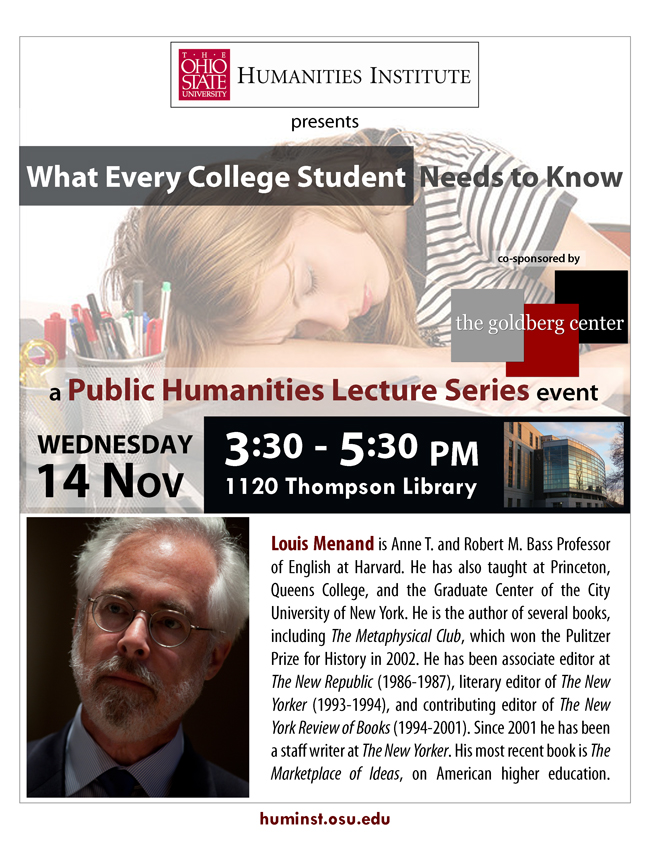2017-18 Lectures
What is Populism?
Friday, Dec 8 2017 Location TBA
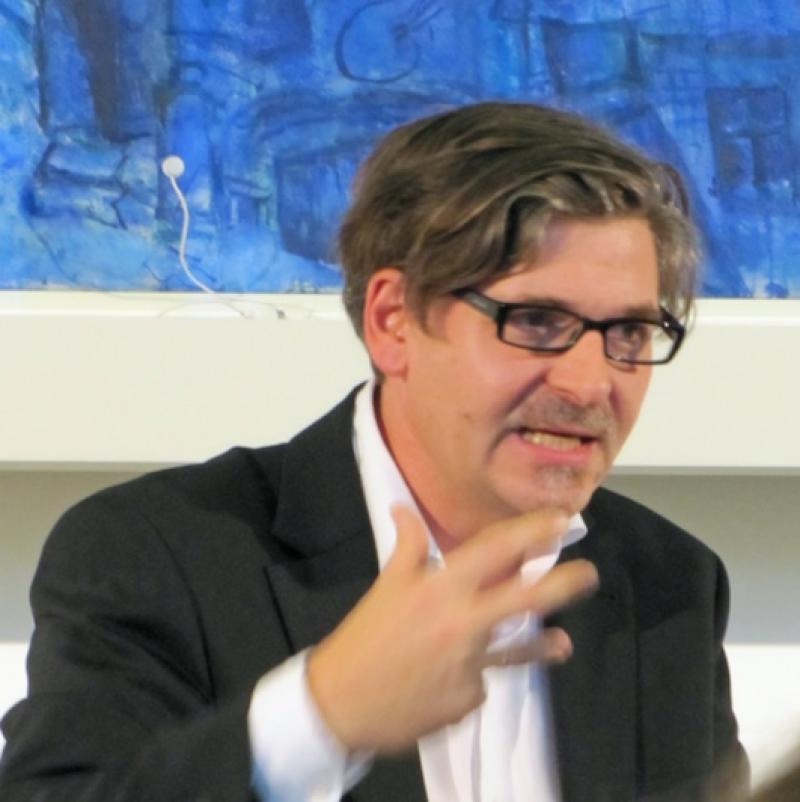
Jan-Werner Müller, Professor of Politics at Princeton University, is one of the world's leading authorities on political ideas and ideolgies. He is author of several books, most recently Contesting Democracy: Political Ideas in Twentieth Century Europe. He contributes regularly to London Review of Books, the Guardian, and the New York Review of Books.
2015-16 Lectures
The Great Mistake: How We Wrecked Public Universities, and How We Can Fix Them

The results of the private funding experiment are in: it has hurt public universities rather than helped them. This talk will lay out the issue, argue that 2016 has brought a sea-change in our hopes for and understand of public universities, and outline how we can make them more accessible, affordable, exciting, and socially valuable than ever before.
Christopher Newfield is Professor of literature and American studies at the University of California, Santa Barbara. Much of his research is in Critical University Studies, which links his enduring concern with humanities teaching to the study of how higher education continues to be re-shaped by industry and other economic forces. His most recent books on this subject are Unmaking the Public University: The Forty Year Assault on the Middle Class (link is external) (2008), and Ivy and Industry: Business and the Making of the American University, 1880-1980 (link is external) (2003). A new book on the post-2008 struggles of public universities to rebuild their social missions, called The Great Mistake, will be published by Johns Hopkins University Press in Fall 2016. He blogs on higher education policy at Remaking the University (link is external), and writes for the Huffington Post (link is external), Inside Higher Ed, and the Chronicle of Higher Education (link is external). He teaches courses in Detective Fiction, Noir California, Contemporary U.S. Literature, Innovation Theory, and English Majoring After College.
"Climate Change and the Humanities"
The question of the Anthropocene, the proposed new name for a geological epoch to mark the role humans have played in changing the climate of the planet, is now exploding across the humanities. This lecture explores how disciplines in the humanities are challenged by climate change and how they might in turn contribute to its understanding.
Dipesh Chakrabarty is currently the Lawrence A. Kimpton Distinguished Service Professor in History, South Asian Languages and Civilizations, at the University of Chicago. He is also a faculty fellow of the Chicago Center for Contemporary Theory and an associate faculty of the Department of English. He is a founding member of the editorial collective of Subaltern Studies, a consulting editor of Critical Inquiry, a founding editor of Postcolonial Studies, and has served on the editorial boards of the American Historical Review and Public Culture. He was one of the founding editors, with Sheldon Pollock from Columbia University and Sanjay Subrahmanyam from UCLA, of the series, South Asia Across the Disciplines, published by a consortium of three university presses (Chicago, Columbia, and California).
Chakrabarty has recently published two books: The Calling of History: Sir Jadunath Sarkar and His Empire of Truth (University of Chicago Press, 2015) and Historical Teleologies in the Modern World, coedited with Henning Trüper and Sanjay Subrahmanyam (Bloomsbury, 2015).
"Nature and Environment in Modern Germany: A Difficult History"

David Blackbourn is Cornelius Vanderbilt Distinguished Chair of History and Co-Director of the Vanderbilt History Seminar. He has written on a wide range of subjects within the field of German history since the eighteenth century. He is the author of six books: Class, Religion and Local Politics in Wilhelmine Germany (1980), The Peculiarities of German History (with Geoff Eley, 1984), Populists and Patricians (1987), Marpingen: Apparitions of the Virgin Mary in Nineteenth-Century Germany (1993), winner of the Hans Rosenberg Prize, History of Germany 1780-1918: The Long Nineteenth Century (2nd ed, 2002), and The Conquest of Nature: Water, Landscape and the Making of Modern Germany (2006), winner of the George Mosse Prize and the Charles A. Weyerhaeuser Prize for Best Book in Forest and Conservation History. He has also co-edited two volumes. He is a Fellow of the American Academy of Arts and Sciences, a Corresponding Fellow of the British Academy, President of the Friends of the German Historical Institute Washington, and a member of the editorial board of the journal Past and Present. He has received fellowships from the Guggenheim Foundation and the Alexander von Humboldt Foundation, among others, and his work has appeared in eleven languages. He is currently working on a book about Germany in the World, 1500-2000, a global history.
David Blackbourn has taught courses on Western Civilization, modern European history, modern German history, and the history of religion and popular piety. He is currently teaching courses on Germany in the Twentieth Century, Religion and Popular Culture in Nineteenth-Century Europe, and Max Weber in His Time, as well as a graduate seminar on Problems and Sources in Modern German History.
"Black Earth: The Holocaust as History and Warning"

Timothy Snyder is Bird White Housum Professor of History at Yale University. He is the author of five award-winning books, including: Nationalism, Marxism, and Modern Central Europe: A Biography of Kazimierz Kelles-Krauz (Harvard Press, 1998); The Reconstruction of Nations: Poland, Ukraine, Lithuania, Belarus, 1569-1999 (Yale Press, 2003); Sketches from a Secret War: A Polish Artist’s Mission to Liberate Soviet Ukraine (Yale Press, 2005); The Red Prince: The Secret Lives of A Habsburg Archduke (Basic Books, 2008). He is also the co-editor of two books Wall Around the West: State Power and Immigration Controls in Europe and North America (Rowman and Littlefield, 2001) and Stalin and Europe: War, Terror, Domination (forthcoming). In 2010 he published Bloodlands: Europe Between Hitler and Stalin, a history of Nazi and Soviet mass killing on the lands between Berlin and Moscow. It has received a number of honors, including the Leipzig Prize for European Understanding and the Ralph Waldo Emerson Award in the Humanities. Most recently he helped Tony Judt to compose a thematic history of political ideas and intellectuals in politics, Thinking the Twentieth Century, published by Penguin in February 2012.
"The Arc of a Memorial Vernacular: Between Berlin’s Denkmal and New York’s 9/11 Memorial”
James E. Young is Distinguished University Professor of English and Judaic Studies at the University of Massachusetts Amherst where he directs the Institute for Holocaust, Genocide, and Memory Studies. In this slide-lecture, Professor Young will trace what he calls “the memorial’s arc” from Maya Lin’s Vietnam Veterans’ Memorial, to German Holocaust memorials, to the National September 11 Memorial in New York City. Professor Young served on the design juries for both Berlin’s Memorial for Europe’s Murdered Jews and for the 9/11 Memorial competition and will discuss these processes from his perspective as a juror.
.
The Wolftrap: Into the Woods with Fairy Tales
September 17, 2015
4:30 pm, Room 165 Thompson Library
Maria Tatar is the John L. Loeb Professor of Germanic Languages and Literatures. She chairs the Program in Folklore and Mythology at Harvard University, where she teaches courses in German Studies, Folklore, and Children’s Literature. She is most recently author of The Annotated Peter Pan (W. W. Norton & Co., 2011) and Enchanted Hunters: The Power of Stories in Childhood (W. W. Norton & Co., 2009)
2014-15 Lectures
 A Conversation on Race, Writing and Culture with Zadie Smith
A Conversation on Race, Writing and Culture with Zadie Smith
5 pm, Mershon Auditorium
THE PRESIDENT AND PROVOST'S DIVERSITY LECTURE & CULTURAL ARTS SERIES co-presented by the Humanities Institute
photo by Dominique Nabokov
Zadie Smith - Prize-winning Author of White Teeth and On Beauty
Novelist Zadie Smith was born in North London in 1975 to an English father and a Jamaican mother. She read English at Cambridge, graduating in 1997. Her acclaimed first novel, White Teeth (2000), is a vibrant portrait of contemporary multicultural London, told through the story of three ethnically diverse families. The book won a number of awards and prizes, including the Guardian First Book Award, the Whitbread First Novel Award, the Commonwealth Writers Prize (Overall Winner, Best First Book), and two BT Ethnic and Multicultural Media Awards (Best Book/Novel and Best Female Media Newcomer). It was also shortlisted for the Mail on Sunday/John Llewellyn Rhys Prize, the Orange Prize for Fiction and the Author’s Club First Novel Award. White Teeth has been translated into over twenty languages and was adapted for Channel 4 television for broadcast in autumn 2002. Her tenure as Writer in Residence at the Institute of Contemporary Arts resulted in the publication of an anthology of erotic stories entitled Piece of Flesh (2001).
More recently, she has written the introduction for The Burned Children of America (2003), a
collection of eighteen short stories by a new generation of young American writers.
Zadie Smith’s second novel, The Autograph Man (2002), a story of loss, obsession and the
nature of celebrity, won the 2003 Jewish Quarterly Literary Prize for Fiction. In 2003 and
2013 she was named by Granta magazine as one of 20 ‘Best of Young British Novelists’. Her
third novel, On Beauty, was published in 2005, and won the 2006 Orange Prize for Fiction. She has also written a nonfiction book about writing entitled Fail Better (2006). Her book, Changing My Mind: Occasional Essays, came out in 2009. Her novel, NW (2012) was named as one of the New York Times ‘10 Best Books of 2012.’ Zadie Smith is currently a tenured professor of Creative Writing at New York University.
“Smith has an astonishing intellect. She writes sharp dialogue for every age and race—and she’s funny as hell.”
—Newsweek
“Zadie Smith is not merely one of Britain’s finest younger writers, but also one of the
English-speaking world’s best chroniclers of race, class, and identity in urban confines.
Smith remains fearless, and there are moments that astonish. Her ambition and talent continue to awe.”
—Philadelphia Inquirer
“Endlessly fascinating...remarkable....The impression of Smith’s casual brilliance is what constantly surprises, the way she tosses off insights about parenting and work that you’ve felt in some nebulous way but never been able to articulate.”
— The Washington Post
Steven Barclay Agency
12 Western Avenue
Petaluma, California 94952 t e l 707.773.0654
f a x 707.778.1868
info@barclayagency.com www.barclayagency.com
"Some Animals Are More Equal Than Others"
Thursday, October 9, 2014 - 4:00pm - 5:30pm
Wexner Center for the Arts Film/Video Theater
Sue Coe. 1992. Photograph by Steve Heller.
Courtesy Galerie St. Etienne, New York.
Sue Coe is considered one of the foremost political artists working today. Born in England in 1951, she moved to New York in the early 1970’s. In the years that followed, she was featured on the cover of Art News and in numerous museum collections and exhibitions, including a retrospective at the Hirshhorn Museum in Washington. A firm believer in the power of the media to effect change, Coe has seen her work published in The New York Times, the New Yorker, Rolling Stone and countless other periodicals. Similarly, Coe sees printmaking as a way to reach a broad audience. Accessible and affordable, Sue Coe’s etchings, lithographs and woodcuts have become extremely popular.
While Ms. Coe’s work covers a variety of subjects, she has spent years documenting the atrocities committed by people against animals and continues to generate both prints and art on that subject. Her series of prints The Tragedy of War examines the atrocities that humans commit against one another, specifically revealed by the horrors of war. Recent projects include her publication Bully: Master of the Global Merry-Go-Round (2004), a scathing critique of the Bush administration, as well as the book Sheep of Fools… a song cycle for 5 voices, which gives a broad history of sheep farming, highlighting the abuses of the animals for human gain.
Ms. Coe’s 2010 exhibition at the Galerie St. Etienne, "ELEPHANTSWE MUST NEVER FORGET: New Paintings, Drawings and Prints by Sue Coe," will be published shortly. “MAD AS HELL!,” Sue Coe’s 2012 exhibition at the Galerie St. Etienne, featured new work by Ms. Coe concomitantly published in book form as Cruel, a continued, critical look at the Animal Industry that builds upon her groundbreaking 1996 book Dead Meat, published by O/R books in 2013. This past year, Sue Coe was awarded the prestigious Dickinson CollegeArts Award in Carlisle Pennsylvania.
Other publications include How to Commit Suicide in South Africa (1983), X (1986), Police State (1987), Dead Meat (1996), and Pit’s Letter (2000), Bully! Master of the Global Merry-Go-Round (2004), Sheep of Fools…A Song Cycle for Five Voices (2005), The Ghosts of our Meat (2013).
2013-14 Lectures
"The Soul of the Humanities"
March 27, 3:30 pm, Room 1120 Thompson Library
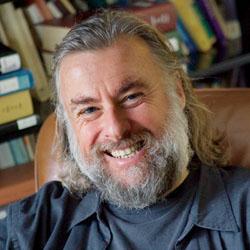 Mark Edmundson is Professor of English at the University of Virginia. His areas of specialty are 19th century American, 19th century British, Poetry, and Romanticism.
Mark Edmundson is Professor of English at the University of Virginia. His areas of specialty are 19th century American, 19th century British, Poetry, and Romanticism.
In Why Read? published by Bloomsbury in 2005, Edmundson reconceives the value and promise of reading. He enjoins educators to stop offering up literature as facile entertainment and instead teach students to read in a way that can change their lives for the better. At once controversial and inspiring, this is a groundbreaking book written with the elegance and power to change the way we teach and read.
In The Death of Sigmund Freud: Fascism, Psychoanalysis and the Rise of Fundamentalism, published by Bloomsbury in 2008, Edmundson traces Hitler and Freud's oddly converging lives, then zeroes in on the last two years of Freud's life, during which he was rescued and brought to London.
Edmundson’s publications include the memoir The Fine Wisdom and Perfect Teachings of the Kings of Rock and Roll, published by HarperCollins in 2010. His work has appeared many journals, including Harper’s Magazine and Chronicle of Higher Education, and his 2011 essay "Who Are You and What Are You Doing Here? / A Message in a Bottle for the Incoming Class" was chosen for inclusion in Best American Essays 2012.
Among other awards, Edmundson has been a Guggenheim Fellow and an NEH Distinguished Teaching Professor
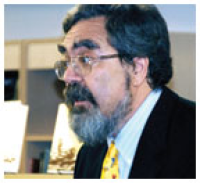
April 10, 4:30 pm
Room 1120 Thompson Library
Anthony Grafton is Henry Putnam University Professor of History at Princeton University. His field is Renaissance and Reformation and Historiography.
Professor Grafton’s special interests lie in the cultural history of Renaissance Europe, the history of books and readers, the history of scholarship and education in the West from Antiquity to the 19th century, and the history of science from Antiquity to the Renaissance.
Professor Grafton likes to see the past through the eyes of influential and original writers, and has accordingly written intellectual biographies of a 15th-century Italian humanist, architect, and town planner, Leon Battista Alberti (Leon Battista Alberti: Master Builder of the Italian Renaissance, Harvery University Press, 2002); and a 16th-century Italian astrologer and medical man, Girolamo Cardano (Cardano’s Cosmos: The Worlds and Works of a Renaissance Astrologer, Harvard University Press, 2000). He also studies the long-term history of scholarly practices, such as forgery and the citation of sources, and has worked on many other topics in cultural and intellectual history.
Professor Grafton is the author of ten books and the coauthor, editor, coeditor, or translator of nine others. His latest collection of essays is Bring Out Your Dead: The Past as Revelation (Harvard University Press, 2002). He has been the recipient of a Guggenheim Fellowship (1989), the Los Angeles Times Book Prize (1993), the Balzan Prize for History of Humanities (2002), and the Mellon Foundation’s Distinguished Achievement Award (2003), and is a member of the American Philosophical Society and the British Academy.
Professor Grafton’s current project is a large-scale study of the science of chronology in 16th- and 17th-century Europe: how scholars attempted to assign dates to past events, reconstruct ancient calendars, and reconcile the Bible with competing accounts of the past. He hopes to reconstruct the complex and dramatic process by which the biblical regime of historical time collapsed, concentrating on the first half of the 17th century.
2013 Lectures
ERIC KLINENBERG - OCTOBER 16, Room 165 Thompson Library, 4:30 pm
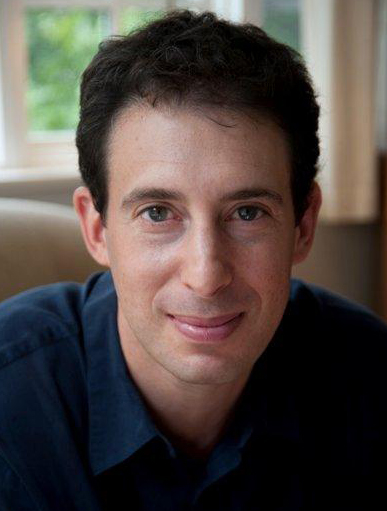 Eric Klinenberg is Professor of Sociology, Public Policy, and Media, Culture, and Communications at New York University where he teaches courses on the sociology of cities, culture, and media, as well graduate seminars on research methods, ethnography, and urban design.
Eric Klinenberg is Professor of Sociology, Public Policy, and Media, Culture, and Communications at New York University where he teaches courses on the sociology of cities, culture, and media, as well graduate seminars on research methods, ethnography, and urban design.
His most recent book, Going Solo: The Extraordinary Rise and Surprising Appeal of Living Alone, was published in February 2012 by the Penguin Press. He is also the author of award-winning books Heat Wave: A Social Autopsy of Disaster in Chicago (University of Chicago Press, 2002) and Fighting for Air: The Battle to Control America’s Media (Metropolitan Books, 2007).
In addition to his post as editor of the journal Public Culture, Klinenberg has contributed to such popular publicationsas The New York Times Magazine, Rolling Stone, The London Review of Books, The Nation, The Washington Post, Mother Jones, The Guardian, Le Monde Diplomatique, Slate, and the radio program This American Life.
Klinenberg is currently working on three research projects: The first, a study of the problem of urban security, examines the rise of disaster expertise, the range of policy responses to emerging concerns about urban risk and vulnerability, and the challenge of cultivating a culture of preparedness. The second explores how social media, crowd sourcing, and the distrust of experts is changing communications during crises. The third is an ongoing ethnographic investigation of news production in a digital age.
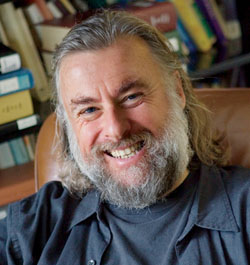 Mark Edmundson is Professor of English at the University of Virginia. His areas of specialty are 19th century American, 19th century British, Poetry, and Romanticism.
Mark Edmundson is Professor of English at the University of Virginia. His areas of specialty are 19th century American, 19th century British, Poetry, and Romanticism.
In Why Read? published by Bloomsbury in 2005, Edmundson reconceives the value and promise of reading. He enjoins educators to stop offering up literature as facile entertainment and instead teach students to read in a way that can change their lives for the better. At once controversial and inspiring, this is a groundbreaking book written with the elegance and power to change the way we teach and read.
In The Death of Sigmund Freud: Fascism, Psychoanalysis and the Rise of Fundamentalism, published by Bloomsbury in 2008, Edmundson traces Hitler and Freud's oddly converging lives, then zeroes in on the last two years of Freud's life, during which he was rescued and brought to London.
Edmundson’s publications include the memoir The Fine Wisdom and Perfect Teachings of the Kings of Rock and Roll, published by HarperCollins in 2010. His work has appeared many journals, including Harper’s Magazine and Chronicle of Higher Education, and his 2011 essay "Who Are You and What Are You Doing Here? / A Message in a Bottle for the Incoming Class" was chosen for inclusion in Best American Essays 2012.
Among other awards, Edmundson has been a Guggenheim Fellow and an NEH Distinguished Teaching Professor.
Public Humanities Lecture Series
2013 lectures
APRIL 24 - 3:30 pm - Wexner Film/Video Theater, 1871 N High St
"Poor Jane's Almanac: Or, the Life and Opinions of Benjamin Franklin's Sister"
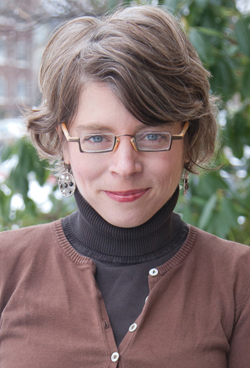 Jill Lepore is the David Woods Kemper ’41 Professor of American History at Harvard College and chair of Harvard's History and Literature Program. She is also a staff writer at The New Yorker and has been a contributor since 2005.
Jill Lepore is the David Woods Kemper ’41 Professor of American History at Harvard College and chair of Harvard's History and Literature Program. She is also a staff writer at The New Yorker and has been a contributor since 2005.
Lepore's books include The Mansion of Happiness: A History of Life and Death (Knopf, 2012); The Story of America: Essays on Origins (Princeton, 2012); The Whites of Their Eyes (Princeton, 2010), a New York Times Book Review Editors’ Choice; and New York Burning (Knopf, 2005), winner of the Anisfield-Wolf Award for the best non-fiction book on race, and a finalist for the Pulitzer Prize, among others.
Book of Ages: The Life and Opinions of Jane Franklin, Lepore's biography of Ben Franklin's sister, will be published by Knopf in 2013.
A co-founder of the magazine Common-place, Lepore’s essays and reviews have also appeared in the New York Times, the Times Literary Supplement, American Scholar, the Los Angeles Times, the Washington Post, The Daily Beast, the Journal of American History and American Quarterly.
Co-sponsored with the Department of History, Project Narrative, and the Wexner Center for the Arts.
Reception following
2012 lecture
NOVEMBER 14
"What Every College Student Needs to Know"
Louis Menand, English and American Literature and Language, Harvard University
[lecturer and event details]

